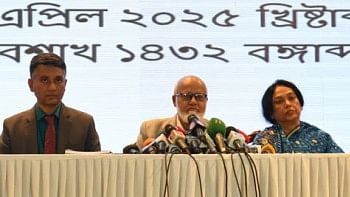<i>None resigned voluntarily</i>

(Fron left) Nazmul Huda; AKM Mosharraf; Syed Abul Hossain; Zahiruddin Khan; Afsaruddin Ahmad; Amir Khasru; Iqbal H Mahmood
Since the restoration of democracy in 1991, nine ministers, including Suranjit Sengupta, have so far resigned following scandals of corruption, irregularities and political conflicts.
During BNP's first tenure in 1991-1996, two ministers -- industries minister Zahiruddin Khan and information minister Nazmul Huda -- were asked to resign.
Khan tendered his resignation after several farmers were killed during a movement in protest of fertiliser crisis. Huda was forced to resign after he commented in favour of introduction of caretaker government system, which at that time was against the policy decision of BNP.
Three ministers -- Maj (retd) Rafiqul Islam, Afsaruddin Ahmad and Syed Abul Hossain -- resigned during the Awami League tenure in 1996-2001.
Maj Rafiq was removed from home ministry apparently for his statement on the 1999 bomb blast at an Udichi programme in Jessore. He said the grenade used in the attack could not be in the hands of civilians as those were only used by the military.
Afsaruddin was asked to resign following a slum eviction in the capital while Abul Hossain for possessing two passports and travelling with the green passport instead of the red one.
During BNP's last tenure in 2001-2006, then commerce minister Amir Khasru Mahmud Chowdhury and state minister for energy AKM Mosharraf Hossain and state minister for power Iqbal Hassan Mahmood were asked to step down.
Amir Khasru resigned allegedly for allowing a syndicate to abnormally hike the prices of essentials and due to a conflict with then finance minister Saifur Rahman.
Mosharraf Hossain was forced to resign for receiving an expensive vehicle as bribe from a Canadian exploration company NIKO and conflict with Hawa Bhaban while Iqbal Hassan resigned reportedly for his failure to manage electricity crisis and conflict with Hawa Bhaban.

 For all latest news, follow The Daily Star's Google News channel.
For all latest news, follow The Daily Star's Google News channel. 



Comments